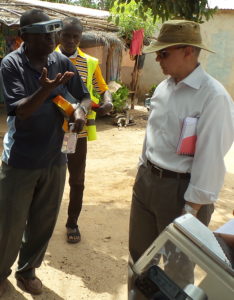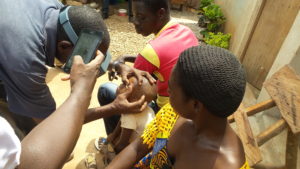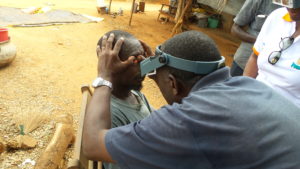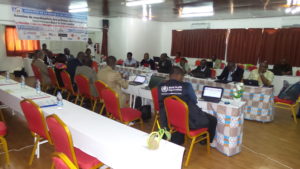Supportive Supervision Visit Reviews Progress in Côte d’Ivoire’s Fight against Neglected Tropical Diseases
October 6th, 2017
Each year, the manager of the END in Africa project Mr. Simon Polanco Bolivar Pou conducts supportive supervisory visits to countries supported by the project to discuss project management, progress and challenges with local neglected tropical diseases (NTD) stakeholders such as the leadership of the Ministries of Health, NTD program staff, project subgrantees, and other in-country NTD partners. During these visits, the project manager works with the stakeholders to find efficient ways of addressing challenges encountered during program implementation. Field trips are also organized for the manager to observe NTD activities as they are implemented. One of the countries visited in 2017 was Côte d’Ivoire.
Côte d’Ivoire is a West African country with an estimated population of 25 million inhabitants. The health care system is divided into 20 Health Regions and 83 Health Districts. Recent political and social crises (2002-2012) have taken a heavy toll on the country’s health system, as numerous hospitals and health centers were vandalized nationwide, and many remain in bad shape. After the last post-electoral crisis in 2012, the United States Agency for International Development and other international partners have been supporting the country to restore basic health services.

END in Africa Project Director Bolivar Pou (r) listens to ophthalmology technician describe the trachoma situation in his community in Côte d’Ivoire. Photo: FHI 360
The Ministry of Health and Public Hygiene in Côte d’Ivoire recently established a National Program for the Control of NTDs targeted through Preventive Chemotherapy (PCT). The PCT NTD program specifically targets lymphatic filariasis, onchocerciasis, schistosomiasis, soil-transmitted helminthiasis (round worm, whipworm and hookworm), and trachoma. In FY2016, USAID began supporting the control and elimination of the 5 PCT NTDs in Ivory Coast through the END in Africa project, which is currently in its second year of operations in Côte d’Ivoire. With the support of the USAID-funded END in Africa project, geographic coverage for the 5 PCT NTDs has increased to almost 100%, and the quality of mass drug administration (MDA) campaigns and monitoring and evaluation interventions has improved significantly.
Efforts to End Trachoma in Côte d’Ivoire
Trachoma is a chronic contagious eye infection caused by the bacteria Chlamydia trachomatis that leads to the formation of follicles and causes other permanent changes in the eyelids and cornea that can end in blindness. The disease is acquired early during childhood and women are affected more often than men, by a 3:1 ratio. The infection is linked with poor education, poor individual and collective hygiene, poor sanitation, and poor access to health services, making it a disease of the poor. The causative bacteriae are transmitted through direct contact with the eye secretions of infected individuals and by flies that land in the eyes of infected individuals and carry their secretions to others.
Efforts to eliminate trachoma in Côte d’Ivoire started with a survey in 11 northern districts in 2015 to determine where to treat the disease (mapping). Of the 11 districts surveyed, 10 were found to be endemic for the disease and to require treatment. Nine additional districts were mapped in 2017, and four of the nine were endemic, bringing the current number of endemic districts to 14. Eye examinations were conducted to detect trachomatous inflammation-follicular (which affects children) among children 1–9 years of age and trachomatous trichiasis (which affects adults) among people 15 years and older. Mass drug administration (MDA) to treat people for trachoma was started in four districts in FY2016, and there are plans for its gradual scale-up to new districts that are identified as endemic through further mapping surveys. MDA, or the provision of drugs to entire populations in specific geographic areas, is a cost-effective mechanism for reducing the occurrence, extent, and severity of trachoma and other NTDs that can also lead to a sustained reduction in disease transmission.
Highlights from the Supportive Supervision Visit
The project manager’s 2017 visit to Côte d’Ivoire centered around three main objectives: (1) holding discussions with PCT NTD program and FHI 360 staff involved in direct implementation of the END in Africa Project in Côte d’Ivoire, to review progress, examine challenges, and identify solutions; (2) conducting a field visit to observe mapping for trachoma in the Abengourou district; and (3) participating in an NTD Partner Coordination meeting.
During the field visit, the manager observed a survey team that examined 30 households in one of 20 randomly selected villages in the Abengourou district, Indenie-Duablin region of Côte d’Ivoire. The visit provided an opportunity for the manager to interact with community members and the survey team. Such annual supervisory visits by project leaders serve as an important means of motivating NTD field actors to maintain their commitment to the control of PCT NTDs in their respective countries.
During his visit, the project manager also participated in a 2-day meeting of PCT NTD partners in Yamoussoukro. The meeting brought together current and potential PCT NTD partners to discuss the provision of support for Côte d’Ivoire’s PCT NTD program. The participants also discussed the program’s achievements, gaps in program implementation, and next steps. In the future, PCT NTD partners will also invite organizations that implement Water, Sanitation and Hygiene (WASH) interventions to upcoming partner coordination meetings. The presence of WASH partners is important because trachoma, schistosomiasis and soil-transmitted helminthiasis are infections influenced by environmental factor and WASH.




